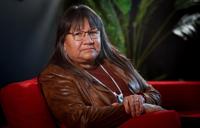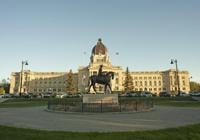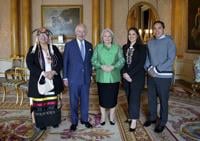OTTAWA - As public safety minister, Marco Mendicino had a full plate of simmering issues and legislative initiatives.
His successor, Dominic LeBlanc, has plenty of leftovers to tuck into — from gun control and RCMP modernization to First Nations policing and tackling financial crimes.
As part of a major cabinet shuffle Wednesday, LeBlanc became minister of public safety, democratic institutions and intergovernmental affairs.
He has a head start on one key issue — addressing concerns about alleged Chinese meddling in Canadian affairs.
Last month, Prime Minister Justin Trudeau asked LeBlanc to consult experts and opposition parties about next steps, including a possible public inquiry into foreign interference.
"I'm very optimistic about that work," LeBlanc said shortly after a swearing-in ceremony Wednesday at Rideau Hall.
"It's not a simple undertaking. But the good news is we've made enormous progress together. We had conversations earlier this week. I'm hoping to have conversations again later this week. And I hope to have something important to announce with my colleagues as soon as possible."
The government is also mulling the creation of a foreign influence transparency registry to keep better tabs on people acting on behalf of other countries.
LeBlanc said he looked forward to discussing the registry proposal with his department and colleagues, "recognizing that this is an important part of Canada strengthening our ability to counter foreign interference."
In addition, LeBlanc will oversee establishment of the national counter foreign-interference co-ordinator, to be based at Public Safety Canada.
Another priority will be shepherding gun-control legislation, now before the Senate, into law and enacting crucial regulations to flesh out the bill.
The legislation would enshrine a national freeze on handguns, increase penalties for firearm trafficking, move to curb homemade ghost guns and usher in new measures to keep firearms out of the hands of domestic abusers.
The legislation also includes a ban on assault-style firearms falling under a new technical definition that would apply to models designed and manufactured after the bill comes into force.
An attempt to amend the bill last November to include such a definition faltered when Conservative MPs and some gun owners vocally objected, saying it would outlaw many commonly used hunting rifles and shotguns.
Gun-control groups disputed that assessment, but the uproar derailed House of Commons committee hearings and created a high-profile political headache for Mendicino.
LeBlanc will also be expected to implement a long-planned federal buyback of outlawed guns and to revive the Canadian Firearms Advisory Committee, which will provide guidance on gun classification.
First elected in 2000, the New Brunswick MP has long been part of Trudeau's trusted inner circle. LeBlanc has previously handled intergovernmental affairs, infrastructure and communities, fisheries and other portfolios.
Given resistance to the gun bill in some parts of the country, it is likely helpful to have a public safety minister with a record of working successfully with the provinces, said Blake Brown, a historian at St. Mary's University in Halifax.
"He's well known as being skilled at carrying files forward," Brown said in an interview. "So the fact they tapped him to have this portfolio does seem to me to highlight they want a skilled hand doing it, not a rookie."
LeBlanc takes the public safety reins amid renewed debate over the role of the RCMP.
Unfinished business includes beefing up the national police force's management advisory board and reviewing its contracting policing role in several provinces and territories.
LeBlanc will also face concerns from civil society groups about two bills before Parliament — one to create a new watchdog for both the RCMP and the Canada Border Services Agency and another aimed at giving authorities new tools to respond to emerging dangers in cyberspace.
Among the other tasks for the new minister:
— Working with Indigenous groups to develop a legislative framework for First Nations policing;
— bringing forward a proposal for a new Canada Financial Crimes Agency; and
— advancing reforms to the criminal pardons program, including the possibility of automatically sealing a person's record for certain offences once they have completed their sentence and lived in the community without new convictions.
This report by Ďă¸ŰÁůşĎ˛ĘąŇĹĆ×ĘÁĎ was first published July 26, 2023.








































